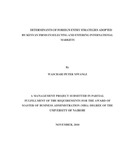| dc.description.abstract | The objectives of the study were to determine the determinants of the foreign market entry strategies and their significance on the optimal choices of foreign markets entry modes selected by Kenyan firms entering in to the international markets, determine the different entry strategies adopted by the Kenyan firms in venturing in to foreign markets and the reasons for these strategies, and to determine the challenges faced by the Kenyan firms in selecting and entering the foreign markets. The research design was a descriptive survey and the population of interest was Kenyan firms listed at the NSE and have ventured in to the foreign markets. The sample consisted of 22 respondents.
Both primary and secondary data was used in this study. Secondary data was collected through reviews of documents while primary data was collected using a semi structured questionnaire. The questionnaire contained both closed and open ended questions. Descriptive statistics was used in data analysis to determine the factors affecting choices of foreign entry strategies and their significance. The findings of the study indicates that the determinants of Kenyan firms in selecting and entering in to the international markets is a function of various parameters, some of which are in the foreign business environment, others in firm characteristics specific factors and motives for foreign markets, and in the very context in which the decision is made.
On the foreign business environment, the study has shown that the legal framework for trade, political factors such as political risk and host country stability, prospects for economic growth and political economic policies were considered to have significant effects on the entry strategies into the foreign markets. The firm's characteristics specific factors considered to have large effects on the choice of the foreign entry strategies are firm's foreign market advantages, firm's resources, firms ownership advantage and the need to leverage on the firm's core competences. On the decision making context, it was found out that personal opinion on the quality of the information, attitude on foreign markets and personal perception on the foreign markets have major effects on entry strategies in to the international markets.
The study has shown that the optimal choices of entry modes varied amongst the respondents. Firms in service and financial industries preferred a joint venture or a wholly owned subsidiary while those in manufacturing preferred exporting before either getting in to a joint venture or setting up a wholly owned plant in the foreign markets. Overall the three most preferred entry strategies were exporting, joint venture and wholly owned subsidiary.
The study found out that government policies such on legal requirements, licensing, taxation and economic are major challenges in selecting and entering foreign markets. Other significant challenges noted are political interferences, lack of financial resources, levels of corruption in the host countries, political instability, poor infrastructure, lack of foreign markets' information and level of competitions in the international markets. | en_US |

